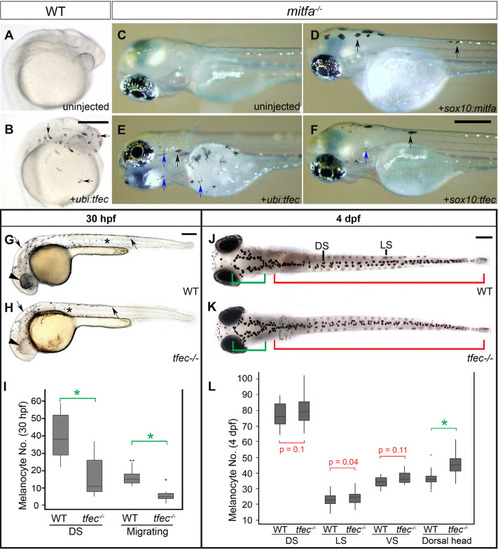|
<italic>tfec</italic> can drive ectopic melanogenesis, and functions in the early stages of melanocyte development.(A,B) tfec cDNA expressed from the ubiquitin promoter induces ectopic melanisation in wild-type embryos by 24 hpf. (C-F) Shown at 72 hpf, tfec expressed from either the ubi or sox10 promoters (E,F) rescues large well-differentiated melanocytes (black arrows) in mitfaw2/w2 embryos, in a manner reminiscent of sox10-driven mitfa (D), as well as apparently smaller, poorly melanised cells (blue arrows) (E,F). (G-I) Pigment cell phenotypes at 30 hpf. Compared to WT siblings (G), tfec mutants (H) have reduced melanisation of the RPE (arrowheads), and reduced melanocytes both along the dorsal trunk (arrows) and on the migratory pathways (asterisks). (I) Quantitation of melanocytes along the dorsal trunk and migratory pathways at 30 hpf reveals a 60% reduction in both regions in tfec mutants with respect to WT siblings. (J-L) Pigment cell phenotypes at 4 dpf. In embryos treated with melanin-concentrating hormone (MCH) to facilitate their quantitation, the number of trunk and tail melanocytes is not significantly altered along the dorsal, ventral or lateral stripes (J,K, red region; quantitated in L), however there is a statistically significant increase in the number of melanocytes located on the dorsal head (J,K, green region; quantitated in L). Scale bars: (A-F), 250 μm; (G,H,J,K), 200 μm. (I,L): spots signify outlier values; *, p-value < 10−9 using t-test.
|

